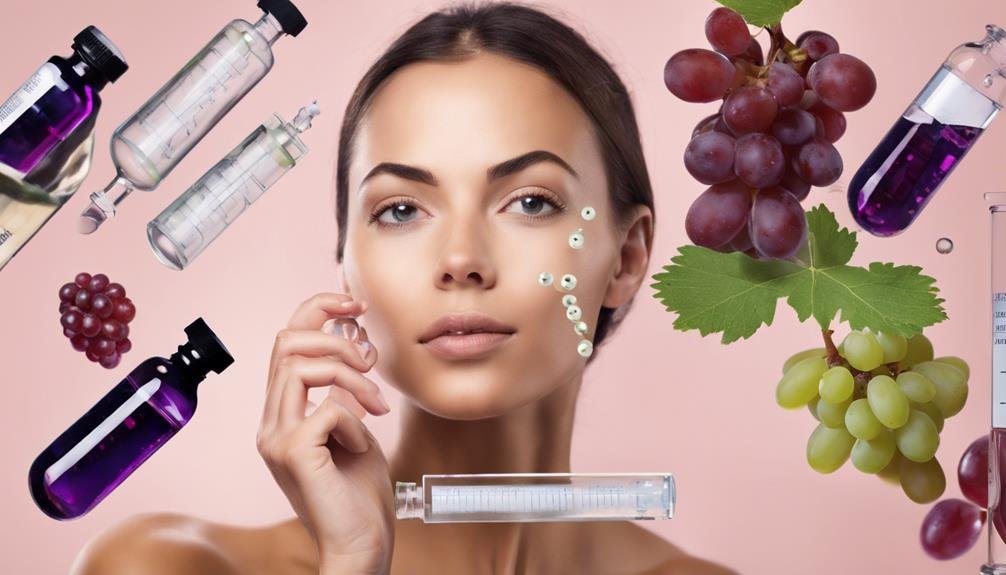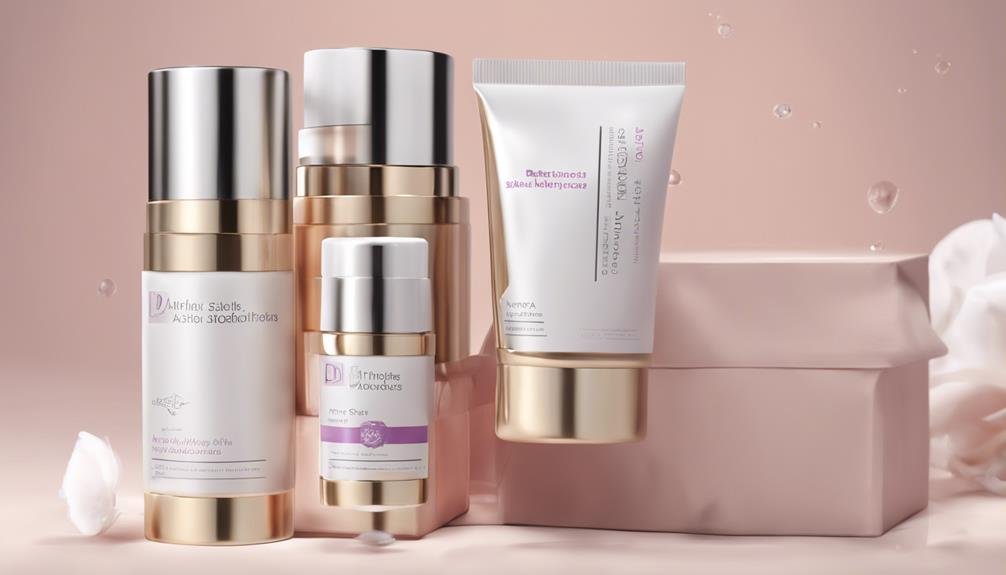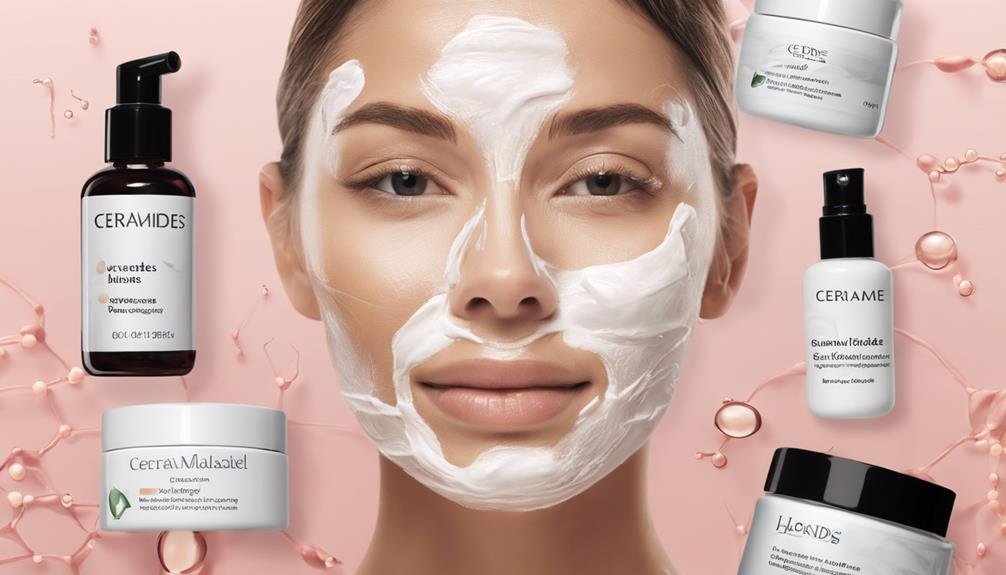When seeking effective anti-aging solutions, consider the power of ingredients like Retinol, Vitamin C, and Hyaluronic Acid. These elements offer a promising pathway towards rejuvenating your skin and combating the signs of aging effectively. But remember, the key to unlocking their full potential lies not just in what they are, but in how they interact with one another. So, before you make your selection, ensure you understand the synergy between these components and how they can work harmoniously to revitalize your skin.
Key Takeaways
- Vitamin C, Coenzyme Q10, Resveratrol: Powerful antioxidants combat aging effects, protect from free radicals, boost collagen production.
- Hyaluronic Acid: Maintains skin hydration, plumpness, and elasticity, providing intense moisture and anti-inflammatory benefits.
- Peptides, AHAs, BHAs: Stimulate collagen production, reduce wrinkles, and improve skin texture for a youthful appearance.
- Niacinamide, Ceramides: Enhance skin texture, strengthen barrier function, reduce inflammation, and improve overall skin health.
- Green Tea Extract: Anti-inflammatory properties, anti-aging benefits, regulate sebum production, and protect against environmental aggressors for youthful skin.
Retinol
When it comes to effective anti-aging ingredients, Retinol stands out as a powerhouse in skincare. Retinol, a form of Vitamin A, is widely recognized for its ability to improve skin texture, reduce the appearance of wrinkles, and promote a more youthful complexion. This potent ingredient works by increasing cell turnover, stimulating collagen production, and diminishing the effects of sun damage.
One of the key benefits of incorporating Retinol into your skincare routine is its effectiveness in addressing fine lines and wrinkles. By promoting cell regeneration and collagen synthesis, Retinol helps to smooth out the skin's surface and enhance its overall firmness.
Additionally, Retinol has been shown to improve skin tone and texture, resulting in a more radiant and even complexion.
When using Retinol, it's important to start with a lower concentration to minimize the risk of irritation and gradually increase the dosage as your skin becomes accustomed to the ingredient. Incorporating Retinol into your nightly skincare routine can lead to noticeable improvements in the appearance of aging skin over time.
Vitamin C
Vitamin C, also known as ascorbic acid, is a potent antioxidant that plays a crucial role in promoting skin health and combating the signs of aging. This powerful ingredient helps protect the skin from free radical damage caused by environmental stressors like UV radiation and pollution.
Additionally, Vitamin C aids in brightening the skin, reducing hyperpigmentation, and stimulating collagen production, which can improve skin elasticity and firmness. When applied topically, Vitamin C can enhance the skin's natural regeneration process, leading to a more youthful appearance.
To maximize the benefits of Vitamin C, look for products with stabilized forms of this ingredient, such as ascorbic acid or sodium ascorbate. These formulations are more likely to remain effective over time and deliver results.
Incorporating Vitamin C into your skincare routine can help you achieve a radiant complexion and address various signs of aging, making it a valuable addition to your anti-aging arsenal.
Hyaluronic Acid
Hyaluronic Acid, a naturally occurring substance in the body, is a key player in maintaining skin hydration and plumpness. As you age, the levels of hyaluronic acid decrease, leading to drier, less elastic skin. By incorporating skincare products containing hyaluronic acid, you can help replenish and retain moisture in your skin, giving it a more youthful appearance.
Hyaluronic acid is a humectant, meaning it attracts and holds onto water molecules, providing intense hydration to the skin. This hydration helps to reduce the appearance of fine lines and wrinkles, giving your skin a smoother and plumper look. Additionally, hyaluronic acid has anti-inflammatory properties, which can help soothe and calm irritated skin.
When choosing products with hyaluronic acid, look for ones with different molecular weights to ensure deeper penetration and hydration at various levels of the skin. Incorporating hyaluronic acid into your skincare routine can help combat signs of aging and keep your skin looking healthy and radiant.
Peptides
Peptides are short chains of amino acids that play a crucial role in various biological functions, including skin health. When it comes to anti-aging skincare, peptides are recognized for their ability to help improve skin texture, reduce the appearance of fine lines and wrinkles, and promote a firmer, more youthful-looking complexion.
Here is a breakdown of some key benefits of peptides in skincare:
| Benefit | Description |
|---|---|
| Enhanced Collagen Production | Peptides can stimulate collagen synthesis in the skin, which is essential for maintaining skin elasticity and firmness. |
| Skin Repair | Certain peptides have been shown to support skin repair processes, aiding in the healing of damaged skin and promoting overall skin health. |
| Antioxidant Properties | Some peptides exhibit antioxidant properties, helping to protect the skin from free radical damage and environmental stressors. |
Integrating peptide-rich products into your skincare routine can help target signs of aging and improve the overall health and appearance of your skin.
Niacinamide
Niacinamide, also known as vitamin B3, is a versatile skincare ingredient that offers a range of benefits for your skin. This powerhouse nutrient is celebrated for its ability to improve skin texture, strengthen the skin's barrier function, and reduce inflammation.
One of the key advantages of niacinamide is its effectiveness in addressing hyperpigmentation and uneven skin tone. By inhibiting the transfer of melanin to the skin's surface, niacinamide can help fade dark spots and even out skin tone, giving you a more radiant complexion.
Moreover, niacinamide is praised for its anti-aging properties. It can boost collagen production, which helps to reduce the appearance of fine lines and wrinkles, leading to firmer and more youthful-looking skin. Additionally, this ingredient is gentle and suitable for most skin types, making it a fantastic choice for those looking to improve their skin's overall health and appearance.
Incorporating niacinamide into your skincare routine can lead to noticeable improvements in the texture, tone, and radiance of your skin.
Coenzyme Q10
With its ability to energize skin cells and protect against oxidative damage, Coenzyme Q10, commonly known as CoQ10, is a potent antioxidant that plays a crucial role in maintaining skin health. CoQ10 helps combat the signs of aging by neutralizing free radicals, promoting collagen production, and reducing the appearance of wrinkles. This powerful ingredient can be found in various skincare products such as serums, creams, and masks.
Here is a breakdown of the benefits of Coenzyme Q10:
| Benefits of Coenzyme Q10 | |
|---|---|
| 1. Antioxidant Properties | Protects against free radical damage |
| 2. Boosts Cell Renewal | Energizes skin cells for a youthful appearance |
| 3. Supports Collagen Production | Helps maintain skin elasticity |
| 4. Reduces Wrinkles | Minimizes the appearance of fine lines |
Incorporating Coenzyme Q10 into your skincare routine can help enhance the overall health and appearance of your skin, making it a valuable addition to your anti-aging arsenal.
Resveratrol
Coenzyme Q10 has established itself as a formidable ally in the battle against aging, harnessing its antioxidant prowess to fortify skin health.
Another powerful anti-aging ingredient to look for is resveratrol. Found in red grapes, peanuts, and berries, resveratrol is a polyphenol known for its impressive antioxidant properties. This compound has gained attention for its potential to combat the effects of aging by neutralizing free radicals that can damage skin cells and accelerate the aging process.
Research suggests that resveratrol may help protect the skin from UV damage, reduce inflammation, and enhance collagen production, leading to firmer and more youthful-looking skin. By incorporating products containing resveratrol into your skincare routine, you can potentially boost your skin's resilience to environmental stressors and promote a more radiant complexion.
When selecting anti-aging products, keep an eye out for resveratrol as a key ingredient to help support your skin's health and vitality in the fight against aging.
Alpha Hydroxy Acids (AHAs)
In the realm of anti-aging skincare, one potent ingredient to consider incorporating into your routine is Alpha Hydroxy Acids (AHAs). These naturally occurring acids, commonly found in fruits and milk, offer a range of benefits for your skin:
- Exfoliation: AHAs work by gently exfoliating the skin's top layers, promoting cell turnover and revealing a brighter complexion.
- Hydration: These acids have humectant properties, helping the skin retain moisture and improve overall hydration levels.
- Collagen Production: AHAs stimulate collagen synthesis, which can help reduce the appearance of fine lines and wrinkles over time.
When using products containing AHAs, it's important to start slowly to avoid irritation, gradually increasing frequency as your skin adjusts.
Incorporating sunscreen into your daily routine is crucial when using AHAs, as they can increase sun sensitivity.
Beta Hydroxy Acids (BHAs)
If you're looking to expand your anti-aging skincare arsenal beyond Alpha Hydroxy Acids (AHAs), Beta Hydroxy Acids (BHAs) offer another effective option. BHAs, such as salicylic acid, are oil-soluble acids that can penetrate deeply into the pores, making them particularly beneficial for those with oily or acne-prone skin.
In addition to their exfoliating properties, BHAs have anti-inflammatory and antibacterial effects, which can help reduce acne breakouts and inflammation.
One of the key benefits of BHAs is their ability to unclog pores and remove dead skin cells, resulting in smoother and clearer skin. They also help to improve the overall texture and tone of the skin, making it look more youthful and radiant. BHAs work by dissolving the bonds between skin cells, allowing them to be easily sloughed off, revealing fresh skin underneath.
When incorporating BHAs into your skincare routine, it's important to start with a lower concentration to avoid irritation, especially if you have sensitive skin. Regular use of BHAs can help diminish the appearance of fine lines, wrinkles, and sun damage, promoting a more youthful complexion.
Vitamin E
Harness the power of Vitamin E, a potent antioxidant known for its skin-nourishing properties. Vitamin E offers numerous benefits for your skin, helping in the fight against aging and promoting a healthy complexion.
- Antioxidant Protection: Vitamin E acts as a powerful antioxidant, protecting your skin from free radicals that can accelerate aging and damage skin cells.
- Moisturization: This vitamin is excellent for maintaining skin hydration, helping to prevent dryness and keeping your skin supple and smooth.
- Sun Protection: While not a replacement for sunscreen, Vitamin E can work alongside it to provide added protection against UV damage, reducing the risk of premature aging.
Integrating Vitamin E into your skincare routine can help combat signs of aging and improve the overall health of your skin. Look for products with Vitamin E listed in the ingredients to experience its rejuvenating effects firsthand.
Ceramides
Vitamin E's role in skincare is undeniable, and now we shift our focus to ceramides, another key player in maintaining healthy skin.
Ceramides are lipids naturally found in the skin, forming a protective barrier that locks in moisture and shields against environmental aggressors. As we age, ceramide levels diminish, leading to dryness, irritation, and a compromised skin barrier. By incorporating ceramides into your skincare routine, you can replenish and fortify this vital barrier, promoting hydration and elasticity.
Research shows that ceramides play a crucial role in skin health. Studies have demonstrated their ability to improve skin texture, enhance hydration, and strengthen the skin's natural defense mechanisms. When applied topically, ceramides work synergistically with other skincare ingredients to maintain a youthful complexion and combat signs of aging.
Look for products containing ceramides to support your skin's barrier function and overall health. Including ceramides in your skincare regimen can help you achieve a radiant, resilient complexion for years to come.
Green Tea Extract
Green tea extract is a potent ingredient in skincare known for its antioxidant properties and numerous benefits for the skin. This extract is rich in polyphenols, which help fight free radicals and protect the skin from damage.
Here are three reasons why you should consider incorporating green tea extract into your skincare routine:
- Anti-Aging Benefits: Green tea extract contains catechins, which have anti-aging properties that can help reduce the appearance of fine lines and wrinkles.
- Anti-Inflammatory Properties: The polyphenols in green tea extract have anti-inflammatory effects, making it beneficial for soothing redness and irritation in the skin.
- Oil Control: Green tea extract can help regulate sebum production, making it a great ingredient for those with oily or acne-prone skin.
Including products with green tea extract in your skincare regimen can help promote a more youthful and radiant complexion while providing protection against environmental aggressors.
Frequently Asked Questions
Can I Use Multiple Anti-Aging Ingredients Together?
Yes, you can use multiple anti-aging ingredients together. It's beneficial to combine ingredients like retinol, hyaluronic acid, vitamin C, and peptides for comprehensive skin benefits. Remember to patch-test and introduce new products gradually for best results.
Are There Any Side Effects of Using These Ingredients?
Using multiple anti-aging ingredients can cause irritation, redness, or dryness. However, by introducing them gradually and monitoring your skin's reaction, you can minimize these effects. Consult a dermatologist for personalized advice.
How Long Does It Take to See Results?
Results vary depending on skin type, regimen consistency, and product potency. Generally, noticeable improvements may be seen within a few weeks to a couple of months. Consistent use of effective anti-aging ingredients is key for optimal results.
Can These Ingredients Be Used on Sensitive Skin?
Yes, these ingredients can be used on sensitive skin. Always do a patch test before full application. Look for products labeled "gentle" or "for sensitive skin." Consult a dermatologist for personalized advice. Enjoy your skincare journey!
Are There Any Specific Products or Brands Recommended for Each Ingredient?
When seeking specific products or brands for each ingredient, you can explore reputable sources such as dermatologist recommendations, consumer reviews, and skincare experts. Researching and comparing options will help you find the best fit for your needs.
Conclusion
In conclusion, when selecting anti-aging skincare products, prioritize ingredients like Retinol, Vitamin C, and Hyaluronic Acid for their proven benefits in reducing signs of aging and promoting skin health. Incorporating these key ingredients into your skincare routine can help you achieve a youthful and radiant complexion. Remember, the key to effective anti-aging skincare lies in choosing products with the right combination of ingredients to target multiple aspects of skin aging. Choose wisely and enjoy the benefits of healthy, youthful skin.







